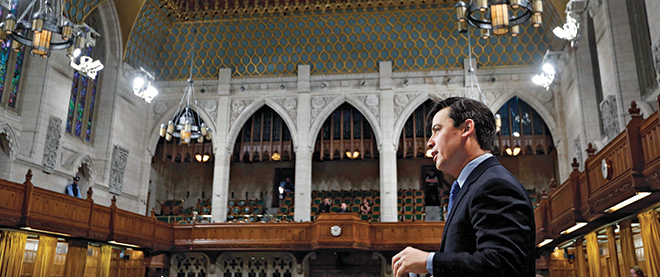The Reform Act debate gets real
Michael Chong’s bill comes before the House
Chris Wattie/Reuters
Share

The first hour of debate on the Reform Act was at least instructive for beginning to clarify where MPs stand and what concerns remain outstanding about the bill’s specifics. For as much discussion as there has been of this bill, the debate is now real.
There is some concern, for instance, about the extent to which Parliament should be able to impose rules on political parties. And within that remains a concern about what power caucus should have to dump a leader that was elected by the party’s membership.
Both Conservative MP Scott Reid and Liberal MP Stephane Dion noted the example of the Australian Labour party—Reid noting its frequent leadership spills and Mr. Dion noting that it recently changed its rules. After Kevin Rudd replaced Julia Gillard in the latest spill, the Labour party adopted new rules for replacing and electing leaders. Sixty percent of caucus is required now to launch a leadership vote within caucus, 75 percent if the incumbent leader is the prime minister. Furthermore, while the party leader had previously been chosen by the caucus alone, Labour’s leadership votes are now split 50-50 between between the caucus and the membership.
Mr. Chong’s bill would provide for a leadership review if 20% of caucus requested one, at which point a majority vote would determine the fate of the leader. (The party membership would then have to pick a new leader or, perhaps, re-elect the deposed one.)
I emailed Mr. Dion’s office to ask about the question he raised Tuesday evening and Mr. Dion elaborated on his points in response.
I have two observations. First, the Labor Party has been able to decide these changes because there were no statutes preventing it [from doing so]. With Mr. Chong’s bill, Canada would likely be the only democracy to impose, by law, the same rules of internal democracy to all national parties and caucuses.
Second, in the Westminster countries mentioned by Mr. Chong, caucuses’ have formal powers to remove the leader because they alone choose the leader (or they have considerable weight in the choice of the leader). Mr. Chong’s bill would pose as the unique norm, this oddity of a leader chosen by the grassroots but who may be removed by half of the caucus.
I suspect it’s inconceivable that any party would revert now to a system whereby the party’s parliamentary caucus determined the party leader—the appeal of a wider vote is too great and to abandon that would seem anti-democratic and no doubt anger the party membership. Could a Canadian party adopt a 50-50 formula? I’m not sure party members and leaders would ever see an incentive to do so. Could the parties accept that caucus should have some formal power to challenge the leader? Maybe. Is it fine for Parliament to set such a rule? That would seem to be part of the question now.
The bill and its supporters will now be tested, but so, I suppose, might the bill’s critics, at least insofar as the latter might be asked what they would do instead. The Reform Act raises at least three fundamental questions: How bad are things? What’s wrong? And what’s to be done about that? Even if general agreement can be found on the first two, its the third where things get complicated.
See previously: Explainer: The story of the Reform Act so far